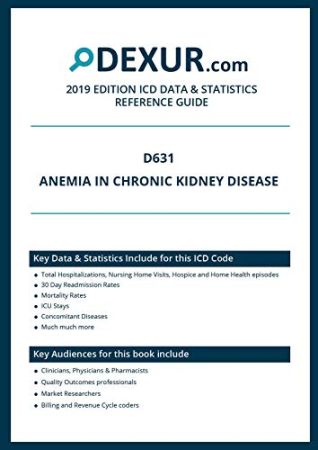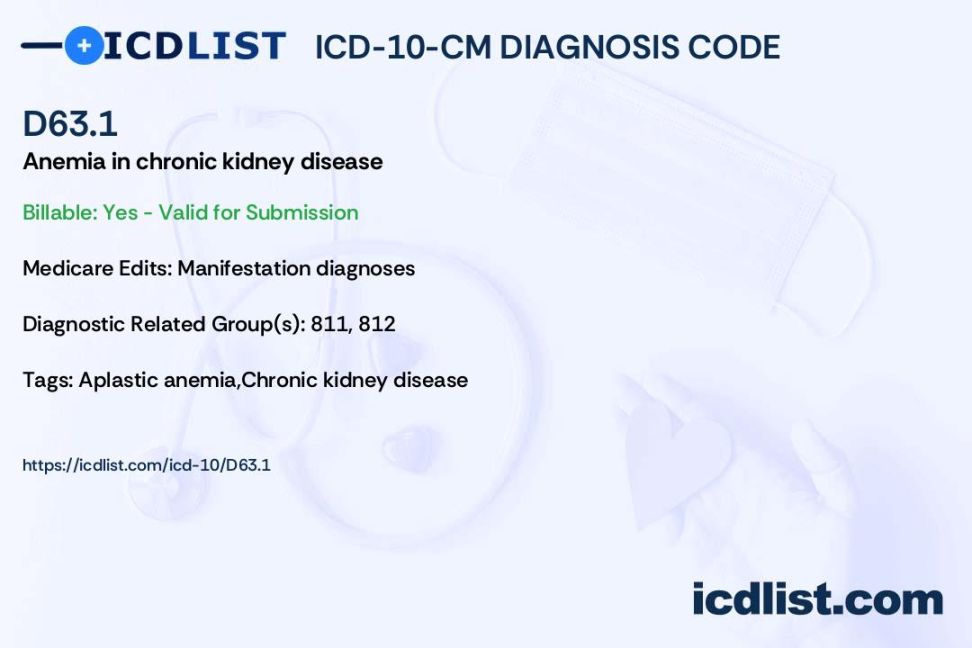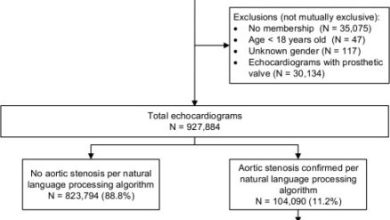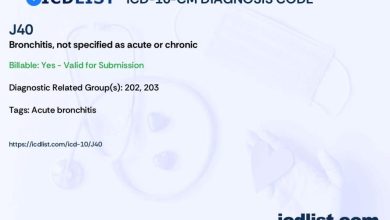Iron Deficiency Anemia In Chronic Kidney Disease: Understanding ICD-10 Codes And Management Strategies
What is Anemia in Chronic Kidney Disease ICD-10?
Anemia in chronic kidney disease is a common complication that occurs when the kidneys are not able to produce enough of the hormone erythropoietin, which stimulates the production of red blood cells in the bone marrow. This results in a decrease in the number of red blood cells in the body, leading to a lack of oxygen being delivered to tissues and organs.
Code Information
The ICD-10 code for anemia in chronic kidney disease is D63.1. This code is used to classify and code diagnoses related to anemia in patients with chronic kidney disease.
Diagnostic Related Groups (MS-DRG)

For patients with anemia in chronic kidney disease, the MS-DRG code is 682 – Renal Failure with CC/MCC. This code is used to classify patients who have chronic kidney disease with complications such as anemia.
Convert to ICD-9 Code
For those looking to convert the ICD-10 code D63.1 for anemia in chronic kidney disease to ICD-9, the corresponding code is 285.21 – Anemia in chronic kidney disease.
Code History

The ICD-10 code D63.1 was introduced in 2015 as part of the transition from ICD-9 to ICD-10 coding systems. It was created to provide more specific and detailed codes for diagnosing and classifying anemia in chronic kidney disease.
Approximate Synonyms
Some approximate synonyms for anemia in chronic kidney disease include anemia of renal disease, renal anemia, and anemia of CKD.
Clinical Information

Anemia in chronic kidney disease is a common complication that affects a significant number of patients with kidney dysfunction. It is often caused by a combination of factors, including decreased production of erythropoietin, impaired iron metabolism, and shortened red blood cell lifespan.
Causes
The primary cause of anemia in chronic kidney disease is the decreased production of erythropoietin by the kidneys. This hormone is responsible for stimulating the bone marrow to produce red blood cells. When the kidneys are not functioning properly, they are unable to produce enough erythropoietin, leading to a decrease in red blood cell production.
Symptoms

Common symptoms of anemia in chronic kidney disease include fatigue, weakness, shortness of breath, dizziness, pale skin, and rapid heartbeat. These symptoms occur because the body is not receiving an adequate supply of oxygen due to the low number of red blood cells.
Diagnosis
Diagnosing anemia in chronic kidney disease involves a combination of blood tests, physical exams, and medical history. Blood tests will typically show low levels of hemoglobin and hematocrit, which are indicators of anemia. A physical exam may reveal symptoms such as pale skin and rapid heartbeat.
Treatment
The primary treatment for anemia in chronic kidney disease is erythropoietin-stimulating agents (ESAs) and iron supplementation. ESAs are medications that stimulate the production of red blood cells in the bone marrow, while iron supplementation helps to replenish iron stores in the body. In severe cases, blood transfusions may be necessary to increase the number of red blood cells in the body.
Conclusion
Anemia in chronic kidney disease is a common complication that can have a significant impact on a patient’s quality of life. It is important for healthcare providers to diagnose and treat anemia promptly to prevent complications and improve outcomes for patients with chronic kidney disease.
FAQs
1. Can anemia in chronic kidney disease be cured?
Anemia in chronic kidney disease can be managed and treated effectively with medications and other interventions, but it may not be completely cured in all cases.
2. Are there any lifestyle changes that can help with anemia in chronic kidney disease?
Eating a healthy diet rich in iron and taking prescribed medications as directed by your healthcare provider can help manage anemia in chronic kidney disease.
3. How long does it take to see improvement in anemia symptoms with treatment?
Some patients may see improvement in their symptoms within a few weeks of starting treatment, while others may take longer to respond to therapy.
4









